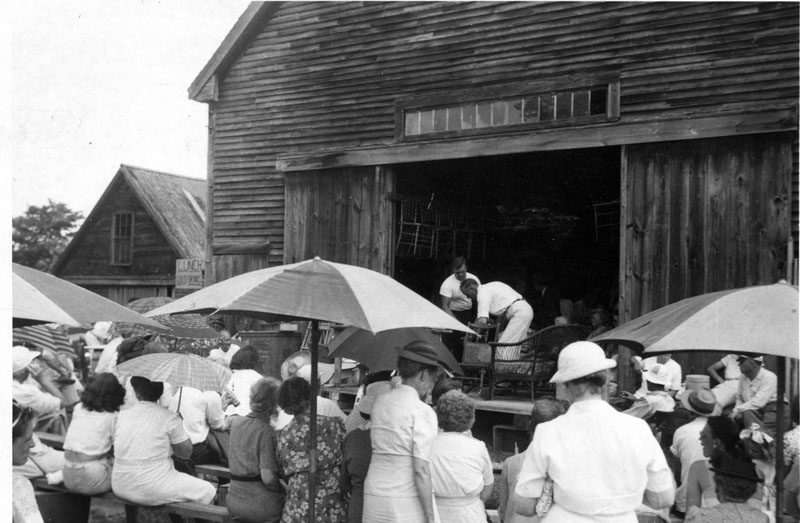
Winfield Cooper conducts an auction at his auction barn on Aug. 16, 1947. Note the women with their different style hats, holding their umbrellas to protect them from the sun. Also note the old blacksmith shop just to the north east of the barn. This was the original Addie Knowlton farm. (Photo courtesy Calvin Dodge collection)
This article starts in the spring of 1943 when the United States was involved World War II, waging a global war against Germany and Japan.
Here in the Twin Villages many of our men and women were working in local shipyards, building ships for the U.S. Navy. Many items like gasoline, oil, tires, cars, trucks were no longer available to the public. Even food items were hard to find and were rationed by the government during the war.
My father-in-law, Winfield F. Cooper, worked at Round Top Farms and was head herdsman in charge of the cattle and milk production. His wife, Kathleen Cooper, was working at Bath Iron Works, in the so-called wire room passing out different type welding rods and equipment. The Coopers were living with their two children in an apartment over the dairy bottling plant at Round Top Farm.
They both wanted to have their own home where their children could enjoy a home of their own. Their daughter, Marjorie, was 13 years old at that time and their son, Llewellyn, was 17.
So Winfield started to look around the Twin Villages for a place to buy. One day his friend Linwood Pratt, a lawyer, informed him the old Knowlton farm was on the market. The farm had a large barn, a 10-room house including four good-size bedrooms, and over 100 acres of land.
The rest is history. In the spring of 1943 the Coopers moved into their new home. Wages were low back in 1943 so Winfield wanted to have a business on the side to bring in extra money.
Winfield Cooper had a friend by the name of George W. Diety who was an auctioneer. Diety suggested Cooper’s large yard and barn was a great place to hold auctions and he offered to help Winfield learn to become an auctioneer and get his license.
Cooper opened his auction barn in 1944. Marjorie catered the auctions and sold pies, cakes, sandwiches, cupcakes, and cold drinks to bring in extra money.
Kathleen Cooper, Beatrice Barstow, Madeline Chapman, and Mattie Hitchcock worked with Winfield as well as one of Winfield’s brothers. When Winfield Cooper started his auction business, his phone number was 1212.
To add to this article, we have photos that plainly show the history of Coopers Auction Barn and Coopers Red Barn Antiques. One great photo shows the old barn and out building during one of the auctions. The out building to the left of the barn was the old blacksmith shop and harness shop at the old Knowlton farm.
Note the 13 pane window over the two large sliding doors of the barn, which ran on an overhead rail. There is also a front side door on the left front that went into a horse stall.
The crowd is sitting on wooden plank placed over milk crates and people had hand awnings to help shade them as well as small umbrellas. The blacksmith and harness shop were torn down by Huston Dodge. It had hand-hewn timbers and large floor planks that were over 20 inches wide and roof boards from 12 to 20 inches wide and sawed with an up and down saw.
Then another photo shows the side of the barn that was boarded straight up and down with 14-foot long boards. The roof had wooden shingles and the front of the barn was boarded with clapboards. The barn was two and a half stories high.
The south side of the barn had a long side building attached to it. This was later torn down. We show you a photo of this side section with a crowd of people at the auction.
Winfield Cooper did auctions all over Lincoln and Knox counties as well as many local charity auctions such as Founders Day at The Lincoln Home, a benefit auction at Union Church of South Bristol, and the AFS auction at Lincoln Academy.
He also did the Miles Memorial Hospital League auction for a number of years.
There’s something about an auction in the country that attracts spectators of all ages from miles away. Winfield Cooper found this especially true in the little town of Damariscotta, where his auction barn became an institution.
Winfield Cooper conducted auctions in his spare time during the summer and early evening. Children loved to wander around the farm and greatly enjoyed standing by a fence watching a number of young pigs inside the fenced yard. There were photos taken and put in the local newspaper of these young children watching these young pigs.
February has given us a few snowstorms and has kept a nice coat of white snow on the ground. This snow will help maintain our water level next spring.
Please keep safe, wash your hands often, and enjoy the rays of the sun as it gets higher each day and the days begin to lengthen.






